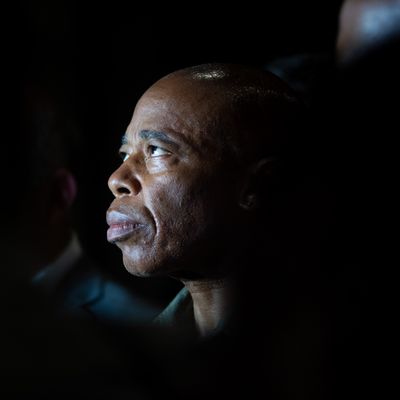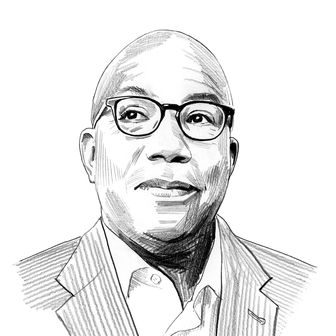
News organizations all over the world — from the Times of India to leading newspapers in France, Germany, and Britain and Australian television — have fixated on the legal drama surrounding Eric Adams, especially the seizure of his phones by the FBI and the agency’s search of the home of the mayor’s chief fundraiser. Add a touch of international intrigue with news reports suggesting the mayor may have pressured city officials to do special favors for Turkish officials (who, in turn, have given free trips and campaign cash to Adams), and you have all the signs of a major municipal scandal in the making.
Is the outcome going to be as momentous as the buildup? Clearly, federal authorities believe that laws have been broken. And clearly, we don’t yet have all the information to know where this is going. But don’t let the coverage lead you to conclude that this scandal will necessarily take down Eric Adams.
It’s nearly certain that Adams — who has hired top attorney Boyd Johnson to defend him — will face uncomfortable scrutiny in the weeks and months ahead, even beyond what he has endured already. Based on what has been reported so far, though, it’s not at all clear that he will be charged with anything. The current contours of the scandal suggest that it might be a distraction and a political liability for him, rather than a death blow to his mayoralty.
Like it or not — I don’t — it is perfectly legal for fat cats to donate to a politician’s campaign and then have them go to bat for those donors by calling agencies, writing letters of support, or otherwise fixing problems for them. The U.S. Supreme Court has ruled that such behavior, which many of us would consider shady and distasteful, isn’t illegal. The one sure violation that can’t be evaded, excused, or explained away is if any donations came from foreign nations, who under federal law are barred from contributing to any U.S. political campaign; we’ve yet to discover if the Feds have evidence of such contributions.
And even if criminal behavior is discovered, it might not involve Adams personally: More than a few New York mayors have suffered the embarrassment of seeing high-ranking aides and allies get prosecuted for wrongdoing about which the mayor knew nothing and in which they never participated (or, at least, prosecutors weren’t able to make a compelling case otherwise).
Adams’s own history suggests a capacity to be near illegal activity without participating in it himself. When he was a state senator, he saw several of his colleagues get into trouble and wind up in prison. Senators Malcolm Smith, John Sampson, Carl Kruger, and Hiram Monserrate were all convicted in separate schemes, from misappropriating public funds to bribe-taking. Notably, Adams was never even touched.
Another senator Adams served with, Shirley Huntley, tried to lighten her own sentence by letting federal agents set up cameras and recording devices inside her home for several months, while she invited other politicians to visit and talk. Feds later said the ruse yielded useful information, but Adams, who was among the visitors, later issued a statement to followers saying, “I WANT TO ASSURE YOU THAT THERE IS NOTHING ON THOSE TAPES THAT WILL IMPLICATE ME IN ANY WRONGDOING.”
It’s hard to imagine that a man who lived through one of the most scandal-tarred eras in Albany history would engage in sloppy schemes after previously watching political allies get carted off to prison. More likely is that Adams turned a blind eye while wayward associates cut shady side deals.
And despite the saturation coverage and wild speculation in political circles these days, the ethical cloud hovering over City Hall is not the biggest story in our city right now. Adams’s legal troubles pale in comparison to the devastating fiscal crisis that is about to result in a deep $7 billion cut in government spending (out of a budget of about $110 billion), which will likely usher in an era of dirtier streets and fewer cops, with noticeable cutbacks in everything from library services to summer-school and pre-K programs.
“He inherits an awful set of circumstances,” says Hank Sheinkopf, a longtime political consultant. “A budget deficit that is almost impossible to close, that has bloated government beyond recognition. Highways are crumbling. Violence is up in schools. School safety agents are not being replaced. It’s a disaster. This is what the guy walks into.”
Adams also walked into City Hall with some questionable habits when it comes to political fundraising. Two years ago, a journalism student named Jeff Winter (now a journalist at CNN) published a little-noticed investigative story about the way then–Borough President Eric Adams systematically developed relationships, including sister-city partnerships, with municipal leaders in Turkey, Azerbaijan, and China, pairing overseas trips with campaign fundraising from locals boasting ties to those countries.
In 2018, according to Winter, a fundraising event for Adams at the Ali Baba restaurant in Manhattan raised $16,000 in a night, with more funds arriving days later, much of it matched eight-to-one under the city’s campaign finance rules. “It was my goal in March, as we started our journey, to get to $1 million by July 11,” Adams said at the event. “We believe before the night is out we’re going to get the number that we wanted to get to. And doing these events is so important.”
“We’re not expecting any special treatment,” said Behram Turan, a leader of the Turken Foundation, which promotes Turkish and Muslim culture. “We just happen to like him personally and see the potential for him to provide good service for New York City, where we have a project.” Adams’s recent headaches include stories suggesting he asked Daniel Nigro, then the fire commissioner, to help speed safety approvals for the newly built Turkish Consulate in Manhattan. Adams says, accurately, that such requests are routine in city government.
But Adams’s connections to China are less routine. An ally named Winnie Greco, who currently works in the administration as the director of Asian Affairs, spent years raising money for the Adams campaign and, notably, for the creation of a 40-foot friendship arch that was supposed to span Eighth Avenue near 61st Street at the entrance of Brooklyn’s Chinatown. As The City has reported, Greco’s project has raised tens of thousands of dollars over the decade since it was announced, but the arch remains unbuilt.
“Different Chinese organizations participated in those fundraising events for Eric Adams. But even after he got elected as a New York City mayor, the archway on Eighth Avenue of Brooklyn was never installed,” complained a neighborhood activist named Queenie Ho. “We Chinese communities feel manipulated, used, and dumped.”
As a local official, Adams ought to be wary of inadvertently allowing foreign governments to influence him; last year, the federal director of national intelligence issued a letter warning local governments to be careful about overseas connections, including sister-city projects, that could be a conduit for the Chinese government to create hidden pressure campaigns ultimately aimed at the White House.
We’ll have to wait and see what federal prosecutors come up with. It’s fairly certain that the wide-ranging searches and seizures going on — especially the startling news that the mayor’s phones and electronic devices were seized by FBI agents — will result in charges against somebody. The FBI doesn’t move so aggressively unless it believes a person is likely to alter or destroy important evidence. We’ll soon discover what it thought Adams was trying to hide.
While the rest of us wait, potential rivals to the mayor are making moves. Some progressive leaders have been in discussions with State Senator Jessica Ramos of Queens about mounting an insurgent run against Adams in 2025. “Ultimately, our city needs a lot better management,” she told me recently. “And I know I know he likes to say that he likes to get stuff done, but really, we want to get him to get work done. That’s what New Yorkers are requiring right now when there is a deep affordability crisis.”
Another hopeful, Senator Zellnor Myrie of Brooklyn — who currently holds Adams’s old seat — has a more indirect critique of how Adams is running the city, suggesting that blaming New York’s budget woes on migrants and on Washington won’t cut it. “It’s important for leaders to step up,” Myrie told me. “At times in our city when we have faced great challenges, our leaders have not run from that challenge. They have not asked someone else to solve that problem, they have stepped up themselves. That’s the New York way, and I believe we should be doing that now.”
Sheinkopf doesn’t think Adams has much to worry about politically. “Everybody will test the waters, but it is almost impossible to defeat an incumbent mayor. It has only happened twice in the last 80 years,” he says. “Here’s the real question: Is the left, and everybody else, going to give this guy a chance to save this city?”






























